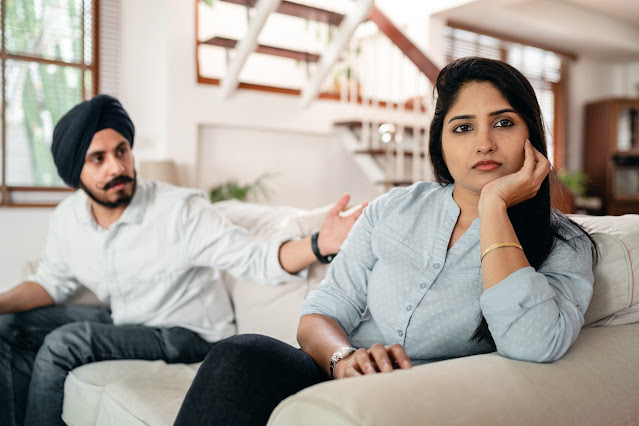13 Unexpected Reasons Why Your Partner Doesn't Want to get Intimate
If your partner doesn't want to have sex very often, there might be more going on than you think. Here are some things that might make you feel bad.
 |
| Photo by Ketut Subiyanto |
Trouble with money Since money problems are a leading cause of breakups (here are some other signs you might be headed for a divorce), it shouldn't be a surprise that even the most happy couples can fight over money. Crystal Hollenbeck, EdD, a licensed mental health counselor in Orlando, Florida, says that if you don't deal with financial stress in your relationship, it can lead to negative feelings toward your partner, fear and anxiety, broken trust, signs of depression, and a lack of sexual desire. "Mixing finances, making a budget, and agreeing on financial goals as a couple will make the relationship feel more close, trusting, and safe."
There is simply too much to do.
It's hard to sit on the couch with your partner and watch a TV show or go to a nice restaurant for dinner without checking your phone every five minutes. You don't have to be an expert to know that those little screens can drive a huge wedge between couples. Celeste Holbrook, PhD, a sexual health consultant in Fort Worth, Texas, says, "If your answer is your phone or tablet and not your partner, it's time to make some changes." "Plug your phone in the kitchen and (gasp!) get a regular alarm clock. Even spending an extra 10 minutes with your partner without using electronics can give your sex life and relationship a big boost. "
There was tension between them. Whether it's because he doesn't pick up his socks off the floor or because she forgets to get her hair out of the shower drain, if the problem isn't dealt with, it can cause a rift between couples. Claudia Six, PhD, is a sexologist in San Francisco and the author of Erotic Integrity: How to Be True to Your Sexuality. She says that any kind of tension that builds up and stays there is the death of sex. "You have to deal with the hurt feelings, solve the problems, apologize sincerely, and learn how to talk to people better." She adds that having these hard conversations is the best way to keep your sex life going.
Not moving enough
Experts at McGill University say that when you get your heart rate up and start sweating during a workout, your body releases chemicals in your brain called endorphins. These chemicals make you feel good and put you in a better mood. This alone can make you want to sleep with your partner more, and if you've worked out hard, you might also feel better about your body. A 2018 study found that even short amounts of exercise "dramatically" improved sexual functioning in the people who took part. So, why don't you just do it? Get moving! Even better, work out with your partner so you can both benefit.
Infidelity
If one or both partners cheated (or "micro-cheated"), it can be hard to get back together sexually. A licensed professional counselor in New Jersey named Wendi L. Dumbroff says, "Whether the man or the woman was cheating, the trust, which is such an important part of a close relationship, has been broken." "Because of this, it's hard to get back into each other's arms." She suggests couples therapy but warns that it isn't always enough to help two people get back together sexually. "Slowly getting back together in ways that make the partner who was cheated on feel safe can help them heal and get close again," she says.
Not being sure of your body
Experts say that you can't have great sex if you don't feel confident. This is true no matter how old you are, what size pants you wear, or how much you weigh. Dumbroff says that couples therapy and sex therapy can help partners talk more openly about sexual issues and make sure they can enjoy the sex they do have. "It's also very important to do mindfulness exercises and learn to be in the moment if you want to really be able to have a positive sexual experience."
Medications
Many medicines can cause low libido or side effects like dryness in the genital area. Dr. Holbrook says that antihistamines can dry out all of your membranes, from your nose to your vagina. "You might be interested in having sex, but you should get some lubricant to make sure it's comfortable." Dr. Holbrook adds that you should always talk to your doctor about side effects before starting a new medication. You should also take the time to figure out any workarounds you might need, such as lubricant, more time in pre-play, or having sex before you take your medications for the day.
Religions or beliefs of one's own
Dumbroff says that even if a person doesn't know why they don't want sex, they may still be carrying messages they learned as a child. These messages can go deep and show up as a lack of desire or even an aversion to sex. "Taking detailed sexual histories and learning about a person's family of origin can help to unpack these beliefs and messages and bring them out into the light," she says. "A person may then feel more free to explore their sexuality and can start to create a new story about sex and what it means to be a sexual being."
Erectile dysfunction
It's not talked about much, but experts at the University of Wisconsin say it happens more often than you might think. About 10% of men per decade are affected by the condition. This means that 40% of men in their 40s, 50% of men in their 50s, and 60% of men in their 60s have it.
"Men would rather avoid a sexual encounter because they think their 'penis doesn't work,'" Dumbroff says, "than be embarrassed in front of a woman, even a significant other." "It could just be performance anxiety because they couldn't get or keep an erection that one time." She says that men should see a doctor first, especially if they suddenly can't get an erection. This could be because of a problem with their genitourinary system or their heart. She also says that sex therapy can help couples think of sex as more than just penetration. Medications can help with erectile dysfunction after the underlying problems have been fixed.
They want to make things interesting.
Sometimes people realize that they may not be attracted to "vanilla sex," but that they are actually attracted to "kinky sex," says Dumbroff. She says this could be a problem if their partner isn't interested. "If the kink person needs that in their life and can't get it from porn alone, they may need to talk about the possibility of getting it from somewhere else," she says. Talk to each other about what you like and what you don't like.
Pain
Dumbroff says that sexual pain keeps many people, especially women, from wanting to have sex. There are several reasons why this real pain happens during sexual activity, which is why she advises both women and men to see a doctor if they are in pain. "Some are definitely caused by physical things, like dryness in women who have gone through menopause or changes in the vaginal mucosa in women who have had chemotherapy," she says. "Pelvic-floor exercises and lubricants can help with dryness, as can certain medical treatments."
Past sexual abuse
Dumbroff says that both men and women who have been sexually abused in the past may avoid sex. "Many times, people have never even connected their history of abuse to problems with their sexual desire, but the effects can be very strong," she says. "This definitely needs couple and sex therapy, and the partner who has been abused in the past needs to be in charge of how fast things move."
Lack of hygiene and etiquette
Self-care is an important part of maintaining sexual desire, no matter how long you've been with your partner. "Practicing good dental and body hygiene and keeping your hair groomed (including the vaginal area, beards and mustaches, underarms and legs, and paying attention to your hair style and maintenance) are things that couples should pay attention to throughout the whole relationship, not just when they are dating or have special events to attend," says Dr. Hollenbeck. "Partners often complain that gas, burping, seeing their partner dress up for work but not when they are spending time together, and the lack of privacy in the bathroom are things that turn them off." Communication is the most important part of solving these problems because your partner can't know what's bothering you if you don't tell him or her.
SUMMARY
If your partner doesn't want to have sex often, there might be more going on than you think. Claudia Six, PhD, is a sexologist in San Francisco and the author of Erotic Integrity: How to Be True to Your Sexuality. When you get your heart rate up and sweat, your body releases endorphins. This alone can make you want to sleep with your partner more. A 2018 study found that even short amounts of exercise improved sexual functioning in the people who took part.
Dr. Holbrook: "You might be interested in having sex, but you should get some lubricant to make sure it's comfortable." You should talk to your partner about what you like and what you don't like about sex. Self-care is an important part of maintaining sexual desire, no matter how long you've been with your partner.



Comments
Post a Comment